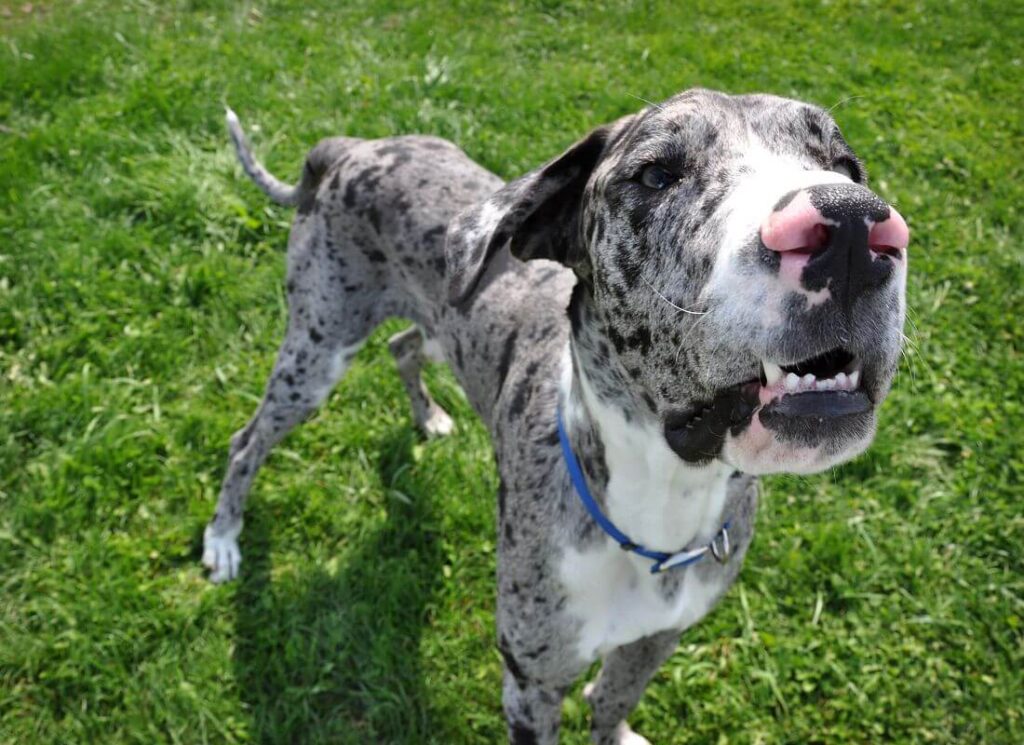Dilated cardiomyopathy (DCM) is a disease of the heart muscle which results in an over-enlarged heart. This is what you need to learn to diagnose cardiomyopathy in dogs.
Dilated cardiomyopathy in dogs is caused by a weakening of the heart muscle, which can lead to an increase in size of the left ventricle. This is manifested as an enlargement or dilatation of the entire heart structure.
In other words, dilated cardiomyopathy in dogs can lead to congestive heart failure. Clinical signs of congestive heart failure, decreased blood flow, irregular heart rhythm or fluid accumulation in the heart muscle should be treated as an emergency as heart disease is often progressive and has no cure.
What is Dilated Cardiomyopathy in dogs?
Dilated cardiomyopathy (CDM) is the most widespread progressive and almost irreversible heart condition affecting humans1. Dilated cardiovascular disease has been reported in the U.K. for the past 15 years in relation to cardiac failure.
Dilated cardiomyopathy is caused by genetic as well as environmental influences. Genetic mutation contributes to DCM in humans though a large percentage of people who suffer from familially related DCM do so in the same family, which reveals surprisingly poor understanding of the causes behind DCM.
What are the symptoms of dilated cardiomyopathy?
Signs that may be seen in dogs with dilated cardiomyopathy include decreased energy, listlessness, exercise intolerance, coughing, difficulty breathing, increased heart rate or arrhythmias. Diagnosis is usually made through physical examination and chest x-rays. Your veterinarian will also likely perform an echocardiogram to get a detailed view of the heart and its structures.
Symptoms of The Early Stages of Congestive Heart Failure
The early stages may show no clinical symptoms, or the animal may display decreased exercise tolerance. The onset of a heart disorder may indicate an abnormal heart beat and irregular heart rhythm.The patient may be diagnosed at the start and after the diagnosis has progressed.
Progressed Dilated Cardiomyopathy
As heart pumpability decreases, blood pressure begins to increase at the back of either side of the heart. A congested and fluidy edema often develops in the ventricular and left ventricles.
Occasionally fluids can accumulate around the abdomen or around the lungs, when the right ventricular side has also become affected or damaged. Symptoms of a cardiac failure can appear more magnified as canine dilated cardiomyopathy progresses.
Red Flags for Heart Failure in Dogs / Clinical Signs to be Aware of
In dogs undergoing heart failure caused by dilated cardiomyopathy, the signs of left-sided recurrent heart failure can include reduced fitness ability and rapid fatigue of muscles.
Sometimes the cough looks soft like the dog has cleared his throat.
Poor blood pumping and rhythms are common symptoms. Several dogs who suffer dilated cardiomyopathy suffer abdominal swelling or heavy breathing due to a leaking stomach.
Clinical signs of dilated cardiomyopathy in dogs include:
- Labored breathing
- Coughing
- Decreased appetite
- Pale gums
- Arrhythmia or irregular heart rate
- Abdominal swelling due to fluid accumulation (ascites)
- Exercise intolerance and sudden collapse.
- Lethargy Anorexia
By knowing the signs of dilated cardiomyopathy in dogs and performing regular check-ups with a veterinarian, you can help ensure that your pup stays as healthy as possible. Knowing the early signs could be the difference in getting DCM diagnosed early before the disease has taken over the heart chambers.
Getting a Dilated Cardiomyopathy Diagnosis
In addition to a comprehensive physical exam, some medical tests are needed to determine DCM in the dog as a potential cause or exclude other maladies.
Physical Examination
Your veterinarian will want to check for dilated cardiomyopathy with a physical examination. Here they can check for an irregular heart rhythm, heart murmur, and listen for signs of heart enlargement.
A thorough physical examination is important so that you and your veterinarian can monitor the disease progression.
Additional Diagnostic Tests
Veterinary medicine has progressed and there are diagnostic tests that can be done to achieve a more accurate. diagnosis.
Blood tests
These are typically done to help rule out other diseases as the cause of the symptoms.
Echocardiogram
An ultrasound of your dog’s heart can be used to evaluate chamber sizes, valve function and blood flow through the heart chambers.
An electrocardiogram can reveal arrhythmias (irregular heartbeat), and cardiac tachycardias (a normal rapid heartbeat). Sometimes it is necessary to undergo an EKG to assess abnormal heart rate for 24hr to determine if there is an underlying abnormal heart rate. An echocardiograph can also be performed for definitive diagnosis of cardiac dysrhythmia.
Radiographic Imaging / Chest Radiographs (xrays)
Radiographic (X-ray) imaging can reveal that dogs can have an enlarged heart.
Chest radiographs will also show any fluid accumulation in the lungs and give a better overview of the heart size. Chest radiographs are very useful in evaluating the progression of canine dilated cardiomyopathy and will be conducted by a board certified veterinary cardiologist.
Causes of DCM in Dogs
DCM is an inherited disease and is most prevalent among dogs aged four to ten years old.
Although it is unclear whether DCM causes dog disease, it is believed to have several factors, including food, infectious disease, and genetic factors.
Nutritional DCM
Nutritional deficiency in taurine and carnitine has been shown to help to cause DCM in many breeds, including cocker Spaniels and Boxer Spaniel.
More regarding diet and this disease in relation to heart function later.
Genetic Mutations can cause Dilated Cardiomyopathy (DCM)
Dilated cardiomyopathy (Dcm) is linked, in some cases, to genetics. When choosing your adorable new puppy , it is important to be aware that there are genetic predispositions towards certain types of serious conditions.
Therefore, you should always speak with your breeder regarding whether their dogs have been diagnosed with or experienced clinical signs of dilated cardiomyopathy.
OFA Health Testing and Dilated Cardiomyopathy in Dogs
OFA Health Testing allows for early detection of genetic mutations
The Orthopedic Foundation for Animals (OFA) offers health testing to identify any genetic mutations that may be present in a breed’s DNA. This health testing is important to help breeders make sure they are not breeding dogs with higher risks of developing DCM or other serious conditions.
Certain Breeds and Heart Disease
Some dog breeds are more prone to heart failure and dilated cardiomyopathy than others.
This does not, however, mean that you cannot get a breed that is prone to DCM. It just means that you should be aware of the risks and talk to your veterinarian about screening for early detection if possible. Additionally, DCM in dogs is a serious disease, so again, checking and verifying health testing prior to bringing a puppy home is crucial.
Breeds that are Prone to Heart Disease
Dogs predisposed to DCM include the Doberman Pinscher, boxer dogs, doberman Pinschers, Golden Retrievers, Portuguese Water Dogs, Great Dane, Boxer, Cocker Spaniels, and English Setter. It is important to speak with a qualified professional before getting a pet from any of these breeds.
Cocker Spaniels, in particular, have been identified as a breed at high risk for the development of DCM.
Giant breeds seem to be more impacted by dilated cardiomyopathy than most dogs of normal size.
What causes dilated cardiomyopathy in dogs?
The causes of dilated cardiomyopathies are often unreachable however inherited predisposition appears in certain breeds. The largest breed is affected most but also occurs in smaller breeds like the Cocker Spaniels. The condition may develop after the toxin or infection is identified in the blood. Compared with humans heart muscle dysfunction is most often triggered by coronary heart disease or heart attack.
Treatment
The goal of treatment for dogs with an enlarged heart is to reduce symptoms, improve quality of life, and extend life expectancy.
Medication
Medications such as ACE inhibitors, beta blockers, anticoagulants, and diuretics can be used to help manage the symptoms of DCM.
Surgery
In some cases surgery may be recommended for certain dogs with dilated cardiomyopathy. Surgical options include heart valve repair or replacement as well as transaortic valvuloplasty.
Diet
Finally, it is important to pay attention to your dog’s diet and provide adequate nutrition, as this can have a tremendous impact on their health outcomes. Your veterinarian may recommend specific dietary adjustments for your pup and monitor their progress over time.
FDA Investigation into Potential Link between Certain Diets and Canine Dilated Cardiomyopathy
Environmental Factors of Heart Function
Is there a possible underlying cause for DCM?
While the exact cause of dilated cardiomyopathy in dogs is still unknown, there has been more recent research and data on DCM in dogs.
Environmental factors that can cause heart failure may include:
- Being overweight or obese
- An unbalanced diet
- Exposure to toxins, like lead poisoning
- A viral infection, like the canine parvovirus
- Heartworm disease
- Certain types of drugs and chemicals that might be toxic to the heart muscle
- A grain free diet
- Taurine Deficiency
- Over feeding or not feeding the right nutritional supplements
- Certain diets
Grain Free Diets and DCM
Although not a definitive cause, the data is becoming louder and louder that feeding a grain free diet will cause dcm in dogs.
However, it isn’t the lack of grain that is the problem.
Grain free kibble’s are formulated with an abundance of legumes such as lentils, peas, chickpeas etc. These ingredients contain a type of carbohydrate called lectins that can bind to heart muscle and disrupt its normal function.
These grains free diets may also be low in the essential amino acid Taurine which is important for keeping the heart healthy.
DCM in dogs has very recently been linked even closer to a grain free diet in a study released in December of 2022. DCM in dogs is a serious disease. If you are feeding your dog a grain free diet with the filler/binder being a legume/pea/chickpea etc, you should speak with your veterinarian to discuss other nutrition options.
How long can a dog live with Dilated Cardiomyopathy?
The prognosis for dogs with dilated cardiomyopathy varies based on the severity of the condition and how well it is managed. While some dogs may live only a few months after diagnosis, others can manage their condition with medication and nutritional support to extend their life expectancy by years or even decades.
It is important to work with your veterinarian to monitor your dog’s condition and adjust treatment when necessary. With appropriate care, many dogs with dilated cardiomyopathy can live happy, healthy lives despite their diagnosis.
Can dogs recover from dilated cardiomyopathy?
DCM in dogs is a scary diagnosis. Heart failure is never something that any pet parent wants to hear in relation to their dog.
Without being treated, small clinical signs like labored breathing can quickly turn into sudden death from heart failure.
But, with the appropriate changes in diet, lifestyle and medication, it is possible for dogs with dilated cardiomyopathy to recover. While recovery is not guaranteed, following your veterinarian’s recommendations will give your pup the best chance for a full recovery and a healthier life.

DCM in Dogs is a Lifetime Disease Process
It is also important to remember that dilated cardiomyopathy cannot be cured; treatment is focused on managing the condition and helping your pup live a longer, healthier life.
Your veterinarian will likely recommend regular check-ups to monitor your pup’s condition and adjust treatment as needed. Your dog may also require medical interventions such as medications, supplements, and occasionally even surgeries such as pacemaker placements or transaortic valve replacements.
It is possible for dogs with dilated cardiomyopathy to live long, happy lives with appropriate management and care. With the right diet and lifestyle changes, you can help your pup manage their condition and improve their quality of life.























